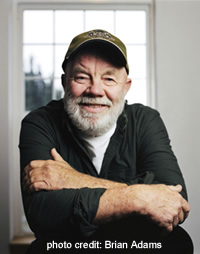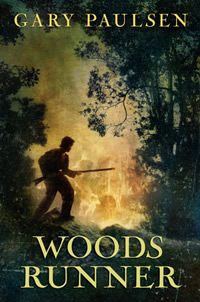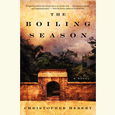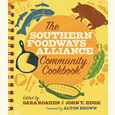Debunking Revolutionary War Myths
Gary Paulsen, the wildly popular and prolific children’s author, talks with Chapter 16 about his latest novel, Woods Runner
Gary Paulsen has written more than 175 books and some 200 articles and short stories for children and adults. He is one of the most prolific, and celebrated, writers of young adult literature today. Three of his novels—Hatchet, Dogsong, and The Winter Room—were Newbery Honor Books, and Hatchet was made into a movie. His writing is often based on his own wilderness experiences, hunting and trapping as a boy, living in a cabin in the remote Minnesota wilds, and running dog sleds in the famous Iditarod race.
When an attack of angina forced him to give up dog-sled racing in 1985, “I started to focus on writing the same energies and efforts that I was using with dogs,” Paulsen writes on his Random House home page. “So we’re talking 18-, 19-, 20-hour days completely committed to work. Totally, viciously, obsessively committed to work, the way I’d run dogs. … I still work that way, completely, all the time. I just work. I don’t drink, I don’t fool around, I’m just this way. … The end result is there’s a lot of books out there.”
 In Woods Runner, Samuel Lehi Smith, age thirteen in 1776, finds himself on his own in the wilderness of Pennsylvania after his parents are captured by the British. Samuel makes his way from his frontier home to the British headquarters in New York City, searching for his parents. The novel alternates sections of fiction with historical segments to set the story in its proper context. “I wanted readers to understand what it was really like to live on the frontier at that time, with virtually nothing—no money, no electricity, no towns, few neighbors—nothing but your own strength,” Paulsen explains in an author’s note.
In Woods Runner, Samuel Lehi Smith, age thirteen in 1776, finds himself on his own in the wilderness of Pennsylvania after his parents are captured by the British. Samuel makes his way from his frontier home to the British headquarters in New York City, searching for his parents. The novel alternates sections of fiction with historical segments to set the story in its proper context. “I wanted readers to understand what it was really like to live on the frontier at that time, with virtually nothing—no money, no electricity, no towns, few neighbors—nothing but your own strength,” Paulsen explains in an author’s note.
He also notes in an afterword that he wanted to depict the true horror of a war that is often prettied up as a grand, almost bloodless, struggle against the most powerful nation on earth at the time. “But the simple fact is that all combat is outrageous—thousands and thousands of young soldiers die horrible, painful deaths lying in their own filth, alone and far from home, weak and hallucinating, forgotten and lost,” Paulsen writes. The Revolutionary War was no exception. “Out of just over 200,000 men who fought, at least half of them died”—of wounds, disease, and infection. “I wanted to dispute the mythic, clean, even antiseptic qualities in many histories, because war is never, not ever, clean,” he writes.
Paulsen discusses this latest novel and his writing life with Chapter 16.
Chapter 16: Your last few books, like Mudshark, feature quirky characters in ostensibly “normal” circumstances, but Woods Runner returns to the wilderness, the setting of so many of your earlier books. What draws you to the woods yourself?
Paulsen: It’s where I feel the most like myself. I get lost in cities, but put me in the bush and I am at home.
Chapter 16: Why do you think young readers are so fascinated by stories of survival? Their lives are pretty cosseted these days.
 Paulsen: I think everyone is fascinated by tales of survival because that’s what we’re all about as living creatures. Whether you’re trying to survive a test or a run in with a bully or a plane crash, we are all just trying to get from one day to the next.
Paulsen: I think everyone is fascinated by tales of survival because that’s what we’re all about as living creatures. Whether you’re trying to survive a test or a run in with a bully or a plane crash, we are all just trying to get from one day to the next.
Chapter 16: How does historical fiction play these days if you don’t throw in a few vampires?
Paulsen: I always say that my stories come from personal inspection and I have never met a vampire, so they don’t show up in my books.
Chapter 16: Is Woods Runner the beginning of a series?
Paulsen: Not that I know of. I think I’m done with Samuel’s story, but, then again, I thought Brian was done after Hatchet. If enough readers want to know what comes next, and I figure out a good story, then maybe, but it’s certainly nothing I have planned.
Chapter 16: Clearly you love dogs. Why do the dogs in kids’ books always have to die?
Paulsen: I can’t speak for every kids’ book, of course, but if there has been death in my books, it’s because that’s real. Everyone, and everything, dies. I’ve never used a death for emotion’s sake, but for the sake of the story.
Chapter 16: Your output is absolutely phenomenal. How do you write so much when you’ve also spent years training for the Iditarod and traveling extensively?
Paulsen: I write every day. It’s who I am; I’m a writer who runs dogs, a writer who sails, a writer who travels. Writing is my life.
Chapter 16: What’s most rewarding to you about your life as an immensely popular and prolific author? Most annoying (other than answering questions from an interviewer)?
Paulsen: Writing makes the hair on the back of my neck raise up. I still love the dance with words. And I really like meeting interviewers, too!
Gary Paulsen will speak at the University of Tennessee on March 2 at 7 p.m. at the University Center Auditorium, 1502 Cumberland Ave. The event, which is jointly sponsored by the Knox County Public Library and the Center for Children’s and Young Adult Literature at the University of Tennessee, is free and open to the public.





